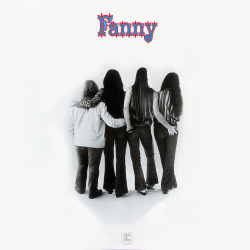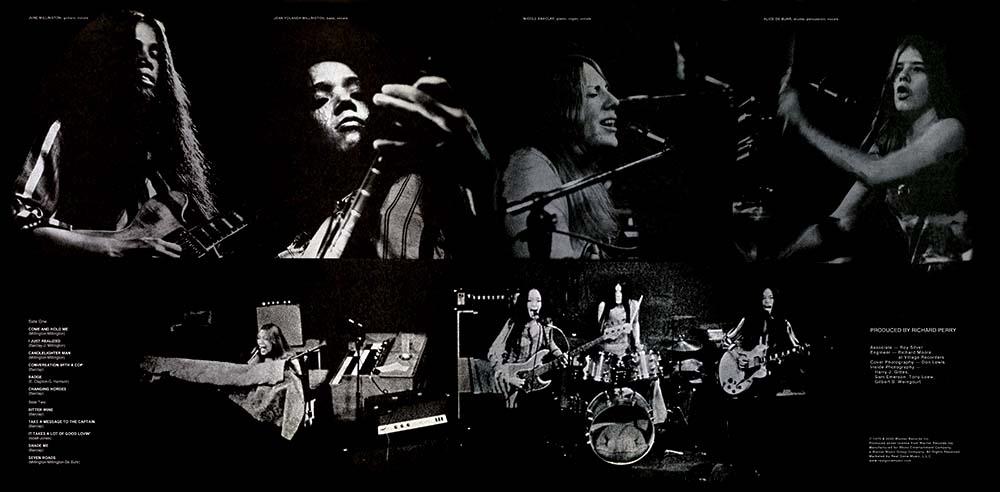Released in 1970 on the Reprise Records label, “Fanny” was a gate-fold album design which opened up to reveal nice studio shots of the band in the studio and gave us fledgling fans a few extra items to read. Produced by Richard Perry, this album is the only album to attempt to catch the band in its rawest form; little over-dubbing, no background horns or strings, just Fanny rocking the studio walls. It makes for a great listening experience next to hearing the band live.
A version of this album was released in Canada by mistake from the wrong set of master recordings. That album version is seen rarely on eBay, but all the tracks are available on the Rhino Handmade CD Anthology. The alternate tracks are listed below.
Fanny
Released: December 1970
Reprise RS6416
Producer: Richard Perry
Come and Hold Me (June Millington, Jean Millington)
A bright and breezy feel-good song to start the album. The Millingtons’ sunny Californian folk rock roots are on show from day one in this acoustic driven song of emotional longing.
I Just Realized (Nickey Barclay, June Millington)
Track 2 and already Nickey Barclay makes herself felt. This is the other side of Fanny’s coin – a darker funkier sound heightened by June’s buzzing guitar and Jean’s octave switching bass line. One of only three songs co-written by Nickey Barclay and June Millington during the band’s lifetime.
Candlelighter Man (June Millington, Jean Millington)
Fanny does Motown with this delightful moderately paced rocker driven by June’s choppy rhythm guitar and Alice’s vice-like drumming. Some good harmony singing and interesting chord shifts lift the chorus.
Conversation With a Cop (Nickey Barclay)
One of Nickey’s best ballads complete with thought-provoking lyric and artfully constructed melody. The band wraps it up in a starkly minimalist arrangement that only underscores its power. June‘s fluid guitar lines and some atmospheric keyboards from Nickey make this one of the best tracks on the album.
Badge (Eric Clapton, George Harrison)
The first of two covers, this is a brave choice bearing in mind the identity of the co-writers. Taken at a slightly faster pace than Cream’s original, the bass line introduction is replaced by a burst of feedback and some trademark piano. This version also showcases some ringing double-tracked arpeggio playing and a Clapton-like solo from June.
Changing Horses (Nickey Barclay)
The long rambling piano intro brings to mind Jethro Tull’s ‘Locomotive Breath’ but when the song finally arrives it reveals Nickey Barclay’s rawest rocker on record. Built on Jean’s rumbling bass lines, it rampages along with June’s sheet metal guitar and urgent on-the-one drumming from Alice. A throat ripping vocal from Nickey completes the sheer exuberance of this song.
Bitter Wine (Nickey Barclay)
A haunting melancholic ballad from Nickey Barclay featuring some subtle wah-wah playing from June and clever vocal arrangements in the chorus. Simple but very effective.
Take a Message to the Captain (Nickey Barclay)
More variety from Nickey as this moderately paced ballad veers into Country and Western and back with its storyboard lyric and June’s sympathetic slide playing. Alice’s chugging rhythm draws you in and the final key modulation always surprises.
It Takes a Lot of Good Lovin’ (Alvertis Isbell, Booker T Jones)
The second cover on the album strays into R&B territory with a typically tough vocal from Jean and some tight ensemble playing from the band.
Shade Me (Nickey Barclay)
More dark funk from Nickey with a touch of Latin in the mix. Jean’s slithering bass introduces the song and remains its foundation through the whole song. A real ensemble piece with each member contributing a well-structured solo.

FANNY
(Canadian Issue pressed from wrong master tapes – Reprise RS6416, 1970)
Charity Ball (June Millington, Jean Millington, Alice de Buhr)
A shorter, sparser version of the song that would end up as the title track on ‘Charity Ball’, their second album.
Place in the Country (Nickey Barclay)
A slower paced, looser, funkier version of the song that would turn up on ‘Charity Ball’.
Changes (June Millington)
A rare June Millington up-tempo rocker boasting some interesting melodic ideas and a great harmonic lurch in the middle section. One of June’s best vocal performances, she really seems to be having fun. Shame this one was dropped for the ‘official’ release.
One Step at a Time (Josephine Armstead, Nickolas Ashford, Valerie Simpson)
This gospel-tinged rocker was originally recorded by Maxine Brown in the mid 1960s and Fanny makes a good job of covering it by stripping it right down to its bare bones and punctuating it with powerfully pregnant pauses. The dual vocal lines are carefully handled and the whole effect is emotionally strong.
Conversation With a Cop (Nickey Barclay)
Same as the version on the ‘official’ release.
Nowhere to Run (Brian Holland, Lamont Dozier, Eddie Holland)
This workmanlike rerun of Martha and the Vandellas’ old Motown hit is not the best cover Fanny has attempted and it is perhaps not surprising that it was dropped for the ‘official’ release.
Seven Roads (June Millington, Jean Millington, Alice de Buhr)
A marginally different take to the version that appeared on the ‘official’ release.
Take a Message to the Captain (Nickey Barclay)
Same as the version on the ‘official’ release.
Come and Hold Me (June Millington, Jean Millington)
Same as the version on the ‘official’ release.
Lady’s Choice (June Millington, Jean Millington)
The last two songs on this album are probably the most interesting. This one has a rhythmically complex melody asking much of Alice’s drumming and Jean’s bass playing. Both rise to the challenge and make this a standout track.
New Day (June Millington, Jean Millington)
A languid and fitting end to the album, this song is beautifully constructed and realized from the unusual melodic ideas and surprising harmonica break, to the loose-limbed play out where Nickey is given full rein to unleash her keyboard prowess. Alice’s jazz drumming and Jean’s walking bass add to the mood perfectly. One of the best songs on the album and should never have been left off the ‘official’ release.


